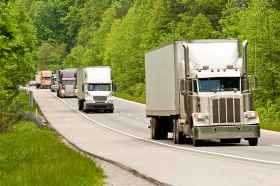Truck Stuck On Grade Crossing!! Train Coming!!! EEEEEK!!!!!
Topic 32869 | Page 2
Classic example of a trailer trying to go over tracks when it's ill-advised. Drivers of these trucks are typically trained to avoid crossing tracks for exactly this reason. Just as it has already been pointed out, trip-planning avoids this. But, it's not just an issue for a lowboy trailer. A driver with A Hazmat load has to follow a precise route to avoid roads that forbid Hazmat. Not all Hazmat is equal. Some roads, especially tunnels, have restrictions on certain types of Hazmat. Oversize and over-dimension loads have to follow precise routes to avoid getting caught in a compromising situation. A situation like that truck getting stuck on the tracks can happen when a driver decides to follow GPS routing without checking the route for potential issues. It can happen when a driver misses a turn for the pre-planned route and decides to follow GPS for rerouting without stopping to find a reroute that doesn't lead to the vehicle and load being compromised. Trip-planning is not optional. It's not simply a way to see where the good places to fuel and park are located. Trip-planning is an essential part of the job in order to make sure that the destination is reached safely and without unnecessary delay.
You post comments and questions that create good conversations, but sometimes I wonder what your real aim is.
As a driver who pulled RGN in both the military and civilian world I gotta tell you that while you’re correct in the statement that drivers who pull these trailers are supposed to be more alert in looking for these types of issues, I can’t tell you how many times I’ve had facilities that I delivered where you had no choice but to get across these types of crossing’s. The key is to recognize it before trying it, get out and assess the situation and then go from there. With a mechanical rgn you don’t have the level of adjustment that you have with a hydraulic trailer. Even loaded, I could still raise that trailer up pretty high to help the situation but you still had to get a run at it to get across. The down side of this practice is that it affects the stability of the trailer, adding in yet another factor to take into consideration. Like so many things, it isn’t always a cut and dry answer.
HAZMAT:
Hazardous Materials
Explosive, flammable, poisonous or otherwise potentially dangerous cargo. Large amounts of especially hazardous cargo are required to be placarded under HAZMAT regulations

Classic example of a trailer trying to go over tracks when it's ill-advised. Drivers of these trucks are typically trained to avoid crossing tracks for exactly this reason. Just as it has already been pointed out, trip-planning avoids this. But, it's not just an issue for a lowboy trailer. A driver with A Hazmat load has to follow a precise route to avoid roads that forbid Hazmat. Not all Hazmat is equal. Some roads, especially tunnels, have restrictions on certain types of Hazmat. Oversize and over-dimension loads have to follow precise routes to avoid getting caught in a compromising situation. A situation like that truck getting stuck on the tracks can happen when a driver decides to follow GPS routing without checking the route for potential issues. It can happen when a driver misses a turn for the pre-planned route and decides to follow GPS for rerouting without stopping to find a reroute that doesn't lead to the vehicle and load being compromised. Trip-planning is not optional. It's not simply a way to see where the good places to fuel and park are located. Trip-planning is an essential part of the job in order to make sure that the destination is reached safely and without unnecessary delay.
You post comments and questions that create good conversations, but sometimes I wonder what your real aim is.
As a driver who pulled RGN in both the military and civilian world I gotta tell you that while you’re correct in the statement that drivers who pull these trailers are supposed to be more alert in looking for these types of issues, I can’t tell you how many times I’ve had facilities that I delivered where you had no choice but to get across these types of crossing’s. The key is to recognize it before trying it, get out and assess the situation and then go from there. With a mechanical rgn you don’t have the level of adjustment that you have with a hydraulic trailer. Even loaded, I could still raise that trailer up pretty high to help the situation but you still had to get a run at it to get across. The down side of this practice is that it affects the stability of the trailer, adding in yet another factor to take into consideration. Like so many things, it isn’t always a cut and dry answer.
I understand and appreciate what you are sharing here. What may be true in theory doesn't always prove viable in practice.
HAZMAT:
Hazardous Materials
Explosive, flammable, poisonous or otherwise potentially dangerous cargo. Large amounts of especially hazardous cargo are required to be placarded under HAZMAT regulations

Ryan is your reply addressing Robert? Or Ambrose (Todd)?
I hope it was a reply meant for Todd, and not Robert.
I can assure you with my own personal experience there is nothing theoretical about Robert’s post on operating an RGN and what can occur regardless of exhaustive planning and precisely following permit friendly routes. He can probably publish a book on running permitted loads, both over weight and dimensionally restricted.
Classic example of a trailer trying to go over tracks when it's ill-advised. Drivers of these trucks are typically trained to avoid crossing tracks for exactly this reason. Just as it has already been pointed out, trip-planning avoids this. But, it's not just an issue for a lowboy trailer. A driver with A Hazmat load has to follow a precise route to avoid roads that forbid Hazmat. Not all Hazmat is equal. Some roads, especially tunnels, have restrictions on certain types of Hazmat. Oversize and over-dimension loads have to follow precise routes to avoid getting caught in a compromising situation. A situation like that truck getting stuck on the tracks can happen when a driver decides to follow GPS routing without checking the route for potential issues. It can happen when a driver misses a turn for the pre-planned route and decides to follow GPS for rerouting without stopping to find a reroute that doesn't lead to the vehicle and load being compromised. Trip-planning is not optional. It's not simply a way to see where the good places to fuel and park are located. Trip-planning is an essential part of the job in order to make sure that the destination is reached safely and without unnecessary delay.
You post comments and questions that create good conversations, but sometimes I wonder what your real aim is.
As a driver who pulled RGN in both the military and civilian world I gotta tell you that while you’re correct in the statement that drivers who pull these trailers are supposed to be more alert in looking for these types of issues, I can’t tell you how many times I’ve had facilities that I delivered where you had no choice but to get across these types of crossing’s. The key is to recognize it before trying it, get out and assess the situation and then go from there. With a mechanical rgn you don’t have the level of adjustment that you have with a hydraulic trailer. Even loaded, I could still raise that trailer up pretty high to help the situation but you still had to get a run at it to get across. The down side of this practice is that it affects the stability of the trailer, adding in yet another factor to take into consideration. Like so many things, it isn’t always a cut and dry answer.
I understand and appreciate what you are sharing here. What may be true in theory doesn't always prove viable in practice.
HAZMAT:
Hazardous Materials
Explosive, flammable, poisonous or otherwise potentially dangerous cargo. Large amounts of especially hazardous cargo are required to be placarded under HAZMAT regulations
OWI:
Operating While Intoxicated

It seems as a number of drivers are obese. Some claim the nature of the job itself engenders such poor health condition. I'm trying to figure out where or how somebody here got the notion that I was obese though. I can't ever recall having posting that information about myself here since joining.
It seems as a number of drivers are obese. Some claim the nature of the job itself engenders such poor health condition. I'm trying to figure out where or how somebody here got the notion that I was obese though. I can't ever recall having posting that information about myself here since joining.
Get those glasses checked, Todd.

HOS:
Hours Of Service
HOS refers to the logbook hours of service regulations.
Ryan is your reply addressing Robert? Or Ambrose (Todd)?
I hope it was a reply meant for Todd, and not Robert.
I can assure you with my own personal experience there is nothing theoretical about Robert’s post on operating an RGN and what can occur regardless of exhaustive planning and precisely following permit friendly routes. He can probably publish a book on running permitted loads, both over weight and dimensionally restricted.
You post comments and questions that create good conversations, but sometimes I wonder what your real aim is.
As a driver who pulled RGN in both the military and civilian world I gotta tell you that while you’re correct in the statement that drivers who pull these trailers are supposed to be more alert in looking for these types of issues, I can’t tell you how many times I’ve had facilities that I delivered where you had no choice but to get across these types of crossing’s. The key is to recognize it before trying it, get out and assess the situation and then go from there. With a mechanical rgn you don’t have the level of adjustment that you have with a hydraulic trailer. Even loaded, I could still raise that trailer up pretty high to help the situation but you still had to get a run at it to get across. The down side of this practice is that it affects the stability of the trailer, adding in yet another factor to take into consideration. Like so many things, it isn’t always a cut and dry answer.
I understand and appreciate what you are sharing here. What may be true in theory doesn't always prove viable in practice.
Wait, that comment was meant for Robert. I think you misunderstood what I was saying. My point to which Robert commented was the theoretical part that trailers of such low clearance shouldn't attempt such crossings. As Robert pointed out from experience, sometimes navigating such crossings with such a trailer is unavoidable. That was the practical part. I was agreeing with what he was saying and basically correcting myself.
OWI:
Operating While Intoxicated

Ryan is your reply addressing Robert? Or Ambrose (Todd)?
I hope it was a reply meant for Todd, and not Robert.
I can assure you with my own personal experience there is nothing theoretical about Robert’s post on operating an RGN and what can occur regardless of exhaustive planning and precisely following permit friendly routes. He can probably publish a book on running permitted loads, both over weight and dimensionally restricted.
Classic example of a trailer trying to go over tracks when it's ill-advised. Drivers of these trucks are typically trained to avoid crossing tracks for exactly this reason. Just as it has already been pointed out, trip-planning avoids this. But, it's not just an issue for a lowboy trailer. A driver with A Hazmat load has to follow a precise route to avoid roads that forbid Hazmat. Not all Hazmat is equal. Some roads, especially tunnels, have restrictions on certain types of Hazmat. Oversize and over-dimension loads have to follow precise routes to avoid getting caught in a compromising situation. A situation like that truck getting stuck on the tracks can happen when a driver decides to follow GPS routing without checking the route for potential issues. It can happen when a driver misses a turn for the pre-planned route and decides to follow GPS for rerouting without stopping to find a reroute that doesn't lead to the vehicle and load being compromised. Trip-planning is not optional. It's not simply a way to see where the good places to fuel and park are located. Trip-planning is an essential part of the job in order to make sure that the destination is reached safely and without unnecessary delay.
You post comments and questions that create good conversations, but sometimes I wonder what your real aim is.
As a driver who pulled RGN in both the military and civilian world I gotta tell you that while you’re correct in the statement that drivers who pull these trailers are supposed to be more alert in looking for these types of issues, I can’t tell you how many times I’ve had facilities that I delivered where you had no choice but to get across these types of crossing’s. The key is to recognize it before trying it, get out and assess the situation and then go from there. With a mechanical rgn you don’t have the level of adjustment that you have with a hydraulic trailer. Even loaded, I could still raise that trailer up pretty high to help the situation but you still had to get a run at it to get across. The down side of this practice is that it affects the stability of the trailer, adding in yet another factor to take into consideration. Like so many things, it isn’t always a cut and dry answer.
I understand and appreciate what you are sharing here. What may be true in theory doesn't always prove viable in practice.
It was meant for Todd. Sorry that this wasn't more clear.
HAZMAT:
Hazardous Materials
Explosive, flammable, poisonous or otherwise potentially dangerous cargo. Large amounts of especially hazardous cargo are required to be placarded under HAZMAT regulations
OWI:
Operating While Intoxicated

It was meant for Todd. Sorry that this wasn't more clear.
This comment was submitted by myself first and then I realized that you were talking about a different post of mine than what I first thought. To be clear, my comment was meant for Robert.
BMI:
Body mass index (BMI)
BMI is a formula that uses weight and height to estimate body fat. For most people, BMI provides a reasonable estimate of body fat. The BMI's biggest weakness is that it doesn't consider individual factors such as bone or muscle mass. BMI may:
- Underestimate body fat for older adults or other people with low muscle mass
- Overestimate body fat for people who are very muscular and physically fit
It's quite common, especially for men, to fall into the "overweight" category if you happen to be stronger than average. If you're pretty strong but in good shape then pay no attention.
It seems as a number of drivers are obese. Some claim the nature of the job itself engenders such poor health condition. I'm trying to figure out where or how somebody here got the notion that I was obese though. I can't ever recall having posting that information about myself here since joining.
Yes many drivers are obese. It isn't because of our job. It's your choices of diet and exercise just like people with other jobs. This career makes it far easier to make those poor choices with how sedentary it is but it's not the job itself that causes it. Sugary drinks, nonstop snacking, fast food or roller dogs in truck stops are the biggest culprits. Those unhealthy foods don't provide nutrients you need so many drivers end up climbing back from the seat and going straight to the sleeper to watch TV. The same people that blame the career as the sole reason for being overweight are the same kind of people that sue McDonald's for making them fat. Our society in general no longer holds people responsible for their own actions.
We have many posts on here that talk about them losing weight while on the road. Kearsey shared a few weeks ago that she's down 45 pounds while driving. I've met Packrat, Old School and Chief Brody. All 3 of those guys are far from obese but that's because they make choices to allow them to stay at a healthy weight.
HOS:
Hours Of Service
HOS refers to the logbook hours of service regulations.New Reply:
New! Check out our help videos for a better understanding of our forum features

















Preview:








 TT On Facebook
TT On Facebook
Not trying to pick on obesity but to clarify, you are correct on smoking tobacco, but one would be better off drinking or smoking dope at a healthy weight based on mortality stats, so throwing the drunks and dopers under the bus isn't a really valid deflective justification for obesity.
Furthermore, smokers that are able to pass a DOT physical are capable of being safe drivers as are felons who have repaid their debt to society who also perform well at their job.
Lastly, thank you for your military service and I sincerely hope you will reincorporate the disciplines you learned during your time of service to better your own wellness.
DOT:
Department Of Transportation
A department of the federal executive branch responsible for the national highways and for railroad and airline safety. It also manages Amtrak, the national railroad system, and the Coast Guard.
State and Federal DOT Officers are responsible for commercial vehicle enforcement. "The truck police" you could call them.
OWI:
Operating While Intoxicated